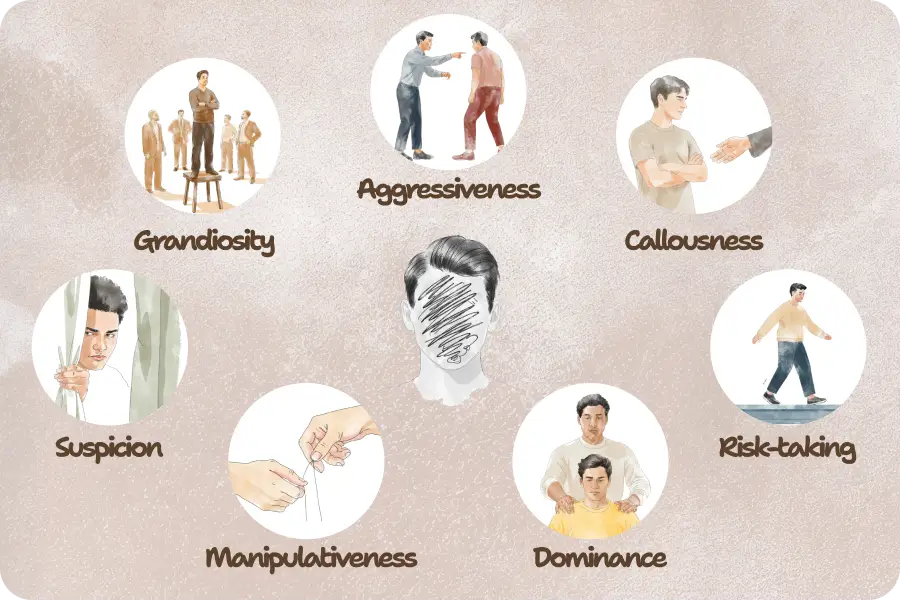A difficult person is someone who’s challenging to communicate with. They might neglect people’s feelings, have an exaggerated sense of self-importance, and exhibit narcissistic tendencies. Other people may avoid them or minimize communication to reduce the number of conflicts.
But when some traits are slightly present, it may be difficult to notice them right away. So, in this article, we provide a difficult person quiz to help you spot these tendencies and understand how they might influence your relationships with others.
Difficult person test
Choose one answer to each statement that describes you best. Don’t overthink it; just pick whatever feels right.
1. Do you find it hard to understand why people get upset over “small things”?
- Yes
- I’m not sure
- No
2. When someone cries in front of you, do you often feel awkward rather than compassionate?
- Yes
- I’m not sure
- No
3. Do you believe that showing too much empathy makes people weak?
- Yes
- I’m not sure
- No
4. Do you often think you could do a better job than your boss or teacher?
- Yes
- I’m not sure
- No
5. When someone gets praised, do you ever feel annoyed or question if they deserve it?
- Yes
- I’m not sure
- No
6. Do you lose interest when people talk about things that don’t seem important to you?
- Yes
- I’m not sure
- No
7. Do you sometimes raise your voice without noticing it?
- Yes
- I’m not sure
- No
8. When someone disagrees with you, do you tend to take it personally?
- Yes
- I’m not sure
- No
9. Do you replay arguments in your head, thinking of what you could have said better?
- Yes
- I’m not sure
- No
10. Do you often doubt people’s authenticity when they compliment you?
- Yes
- I’m not sure
- No
11. Do you find it hard to trust someone fully?
- Yes
- I’m not sure
- No
12. Do you feel uncomfortable sharing personal details, even with close people?
- Yes
- I’m not sure
- No
13. Do you tell people what they want to hear to keep a sense of peace?
- Yes
- I’m not sure
- No
14. Do you ever exaggerate a little to make your point stronger?
- Yes
- I’m not sure
- No
15. Do you tend to hide your real feelings if the truth feels too messy?
- Yes
- I’m not sure
- No
16. Do you believe things work best when you’re the one coordinating them?
- Yes
- I’m not sure
- No
17. Do you find it hard to follow rules you don’t fully agree with?
- Yes
- I’m not sure
- No
18. When someone challenges your opinion, do you feel the need to defend it?
- Yes
- I’m not sure
- No
19. Do you sometimes feel more alive when things are uncertain or intense?
- Yes
- I’m not sure
- No
20. Do you enjoy situations where the outcome isn’t guaranteed?
- Yes
- I’m not sure
- No
21. Do you sometimes make quick decisions just to see what will happen?
- Yes
- I’m not sure
- No
Difficult personality test results
Answers to each statement correspond with the number of points.
- Yes = 2 points
- I’m not sure = 1 point
- No = 0 points
Calculate the total number of points and check which variant fits you.
0-14 points. You definitely aren’t a difficult person
You read other people’s emotions well and know how to foster a healthy atmosphere in the friend group. Even if sometimes you may feel frustrated, angry, suspicious, or impulsive, you tend to think about what others feel because of your actions.
15-28 points. It may be difficult to communicate with you at times
Generally, you are quite easy-going. However, when going through hard times or feeling stressed, you might become a manipulative or aggressive person to ensure your sense of safety. You may also display narcissistic traits and believe in your own grandiosity.
29-42 points. You may need to think about how others feel around you
You might be a difficult person to talk to because you quickly become reactive or judgmental. Sometimes you may act without considering other people’s feelings, which can cause tension or misunderstandings. It also seems like conflicts with others don’t really bother you.
Exploring difficult traits in detail
Now let’s look a little closer. These are the most common personality traits that can influence the result. Think about questions where you answered “Yes” most often, and what patterns they are linked to.
Questions 1-3
Callousness means that you may come across as cold or unemotional. It may be difficult for you to understand and interpret the feelings of others.
Questions 4-6
Grandiosity is a feeling that you’re inherently better than others or more deserving of specific virtues. Grandiose people may live with a narcissistic personality disorder or exhibit some of its traits without a clinical diagnosis. It can also indicate an innate otherness that’s a trait of an otrovert, a personality type like introvert or extrovert.
Questions 7-9
Aggressiveness means that you find it challenging to control your emotions, particularly around shame, anger, or fear. You feel a strong need to defend yourself and to stand your ground, even if it leads to arguments.
Questions 10-12
Suspicion refers to a state of being on edge and finding it challenging to be honest with someone or trust others. You may hide everything inside and process worries on your own to avoid being vulnerable.
Do you trust other people easily?
Questions 13-15
Manipulativeness means that you struggle with needing to assume control over a situation. This can show up via subtle control (passive-aggression, people-pleasing), persuasion, or taking advantage of other people’s vulnerabilities.
Questions 16-18
Dominance is a desire to lead others and control. It can be about leadership skills, but it may also turn into a need to always be in charge and leave little room for others’ opinions.
Questions 19-21
Risk-taking refers to a desire to make impulsive decisions that might get you in trouble. While sometimes it can lead to unpredictable adventures, it can also create trouble for you and your close ones.

Are certain environments or relationships more likely to trigger “difficult” sides of someone’s personality? Nicole Arzt, LMFT, answers, “Yes, unhealthy relationships or stressful environments can activate the more difficult parts of someone’s personality. These ‘difficult’ parts emerged as survival strategies. They are meant to keep a person feeling safe and in control. Therefore, they may feel heightened in situations where safety or control feels most compromised.”
How to change difficult personality traits and improve your interpersonal skills
Good interpersonal skills can help you build strong relationships and improve communication with others. [1] If the difficult person test has shown you a high score, you may need to focus on the following.
1. Ask for constructive criticism
When you lack self-awareness of when you might be rude, the people closest to you can help. Ask trusted friends or family members to share honest examples of your behavior. They may highlight situations when they felt offended or hurt. Your goal is to hear them and avoid similar actions in the future.
Expert Insight
“Practice naming your fears of rejection or abandonment to yourself in advance. Defensiveness is often a strategy to avoid feeling discomfort. Allow yourself to embrace the discomfort and remind yourself that these are people who love you and want to see you do well. When you can hold that framework, it’s easier to take in feedback.”
Nicole Arzt
Mental health professional
2. Pause before you react
If impulsivity is one of your key personality traits, it may be challenging to respond calmly. Instead, take one slow breath or count to 10 when you want to answer aggressively.
3. Work on active listening
A desire to dominate in conversations can easily turn into conversational narcissism. Instead, when you listen attentively to someone and ask clarifying questions, it increases relationship satisfaction and social bonding. [2]
Here are some of the key factors that can help you show genuine interest in others:
- Maintain eye contact
- Paraphrase what you hear to show that you understand the topic
- Don’t interrupt a person
- Ask open-ended questions
- Notice nonverbal cues, like body posture or facial expressions
- Validate their emotions
- Avoid jumping to conclusions or quick solutions to “fix” their problem
4. Get aware of your emotions
You may react aggressively or be manipulative toward others because of past wounds that still influence your present behavior. For instance, childhood trauma, growing up with narcissistic parents, or unresolved past conflicts can shape your responses.
The Breeze app provides features that allow you to find out what motivates such behavior.
- The mood tracker can be helpful to notice specific triggers and avoid them in the future.
- Journaling helps to spot the roots and reflect on your worries.
- Self-discovery tests provide accurate assessments of your inner patterns. They help you find out how you approach the world and people around you while also providing tailored insights to change for the better.
5. Learn to open up step by step
Now that you know why others may consider you a difficult person and how to deal with it, it’s time to take action. It can take some effort to change behavioral patterns you’ve built for years, especially if you’ve faced a negative experience in the past. Studies prove that those whose parents had divorced or who had experienced a relationship breakdown had lower trust scores. [3]
However, embracing change is still possible. To learn to open up and be kinder to others, you can:
- Start by telling small, everyday thoughts to someone you trust
- Listen and respond openly when others share with you
- Share your feelings about a neutral or positive experience
- Reach out to a mental health professional to learn to be more open
Frequently asked questions
What are the seven traits measured in this test?
Difficult person test results reveal how challenging it is to communicate with someone in general. Also, they allow a person to access their traits according to seven elements:
- Callousness
- Grandiosity
- Aggressiveness
- Suspicion
- Manipulativeness
- Dominance
- Risk-taking
Are there any other personality quizzes to improve self-awareness?
Yes, you can analyze specific personality traits and behavioral patterns in the Breeze app. There are more than 30 personality tests where you can learn more about your:
- Relationship patterns
- Past wounds
- Certain traits
- Growth opportunities
- The way you communicate with others
The app also provides you with tailored insights after taking each test, which will help you take care of your well-being and improve relationships with people around you.
Sources
- Beenen G, Fiori M, Pichler S, Riggio R. “Editorial: Interpersonal skills: individual, social, and technological implications.” Front Psychol. 2023
- Kawamichi H, Yoshihara K, Sasaki AT, Sugawara SK, Tanabe HC, Shinohara R, Sugisawa Y, Tokutake K, Mochizuki Y, Anme T, Sadato N. “Perceiving active listening activates the reward system and improves the impression of relevant experiences.” Soc Neurosci. 2015
- Yılmaz CD, Lajunen T, Sullman MJM. “Trust in relationships: a preliminary investigation of the influence of parental divorce, breakup experiences, adult attachment style, and close relationship beliefs on dyadic trust.” Front Psychol. 2023
Disclaimer
This article is for general informative and self-discovery purposes only. It should not replace expert guidance from professionals.
Any action you take in response to the information in this article, whether directly or indirectly, is solely your responsibility and is done at your own risk. Breeze content team and its mental health experts disclaim any liability, loss, or risk, personal, professional, or otherwise, which may result from the use and/or application of any content.
Always consult your doctor or other certified health practitioner with any medical questions or concerns
Breeze articles exclusively cite trusted sources, such as academic research institutions and medical associations, including research and studies from PubMed, ResearchGate, or similar databases. Examine our subject-matter editors and editorial process to see how we verify facts and maintain the accuracy, reliability, and trustworthiness of our material.
Was this article helpful?








